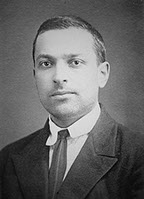Teaching Secondary Reading
A Resource for Improving Academic Literacy with Adolescents ©2015
Zone of Proximal Development
 It is ironic that L. S. Vygotsky, who, though he was a prolific writer, has become best known among teachers for a concept that he wrote little about, the Zone of Proximal Development. It is however a useful notion. Defined as "the difference between what a learner can do without help and what he or she can do with help," it is the sweet spot of engagement-- a little bit harder than what the student can do on her own, but not so difficult that she will lose interest or confidence. It is similar to Gee's (2010) learning principle for gaming, "pleasantly frustrating," or a level of difficulty that is doable for the player, yet remains challenging.
It is ironic that L. S. Vygotsky, who, though he was a prolific writer, has become best known among teachers for a concept that he wrote little about, the Zone of Proximal Development. It is however a useful notion. Defined as "the difference between what a learner can do without help and what he or she can do with help," it is the sweet spot of engagement-- a little bit harder than what the student can do on her own, but not so difficult that she will lose interest or confidence. It is similar to Gee's (2010) learning principle for gaming, "pleasantly frustrating," or a level of difficulty that is doable for the player, yet remains challenging.
This is what Vygotsky wrote: "In play, the child is always behaving beyond his age, above his usual every day behavior; in play, he is, as it were, a head above himself. Play contains in a concentrated form, as in the focus of a magnifying glass, all developmental tendencies; it is as if the child tries to jump above his usual level" (1933).

Vygotsky described four stages of the Zone of Proximal Development (1978). Capacity begins at Stage I where assistance is provided by "more capable others." Those other can include parents and teachers, but, importantly, they can also include peers. In any classroom, there are students who are "getting it" along with those who are not yet getting it. Those who get it can assist those who don't yet.
Through practice and with assistance, the learner moves on to Stage II, where she or he can provide their own assistance. One way to help this process along is to provide learners with a "script" or "algorithm" that provides a step-by-step description of how to properly perform the desired skill.
Through practice, in Stage III the learner develops to the point at which she or he no longer needs to talk themselves through the process. The action is internalized, and no longer requires extra effort.
Just when the learner may feel that she has mastered the action, sometimes there is a "de-automatization," or a regression back to earlier stages. This may be due to encountering an unfamiliar context, or new requirements. The learner then loops back to the beginning and moves through the stages again, resulting in learning that is enhanced and solidified.
What are the implications for instruction? Our goal is to provide opportunities for learners to be assisted, and tools for them to assist themselves.
The views and opinions expressed on unofficial pages of California State University, Dominguez Hills faculty, staff or students are strictly those of the page authors.
The content of these pages has not been reviewed or approved by California State University, Dominguez Hills.